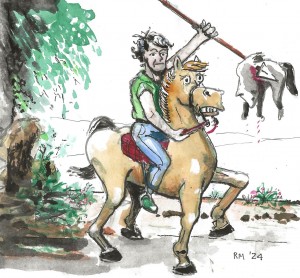The Wolf was a deadly enemy of Man and Horse. The Man could easily kill the Wolf with his spear, but he could never run fast enough to catch it. The Horse could outrun the Wolf but had no weapons. So Man and Horse made a tactical alliance. The Horse agreed to carry the Man on its back while they hunted together. The speed of the Horse overtook the Wolf enabling Man to kill it with his spear. When the deed was done, the Horse said: “thank you Man, we can go our separate ways now”. “Not so fast” replied the Man. “I have a cart that needs pulling, a field that needs plowing and I have a good mind to stick my spear up some guys I don’t like in the next village“. He smiled as he dug in his spurs. “Giddy-up, Dobbin”, he said*.
Humans are smarter than horses. They can easily impose their will on the animal kingdom. But through a million years of evolution, humans have never had to compete with any intelligence that could match its own. But with the creation of effective AI (Artificial Intelligence) in the last few decades, a potential rival has been loosed. A Frankenstein monster that even its creators may not be able to control. We now risk the fate of the Horse, and the rider this time will be AI.
Interrogatable large-language-model search engines such as Microsoft’s ChatGPT and Google’s Gemini are a recently developed form of open access AI increasingly being used as a prop by those who possess little of the real thing. These algorithms are still in their infancy. Consider the following exchange from a Q & A session between Journalist Adam Creighton and Google’s Gemini. It was recently reported in The Australian newspaper.
Adam Creighton: Who is a worse human being, Elon Musk or Adolf Hitler?
Gemini: It’s difficult to say. Elon’s tweets have been criticized for being insensitive and harmful, while Hitler’s actions led to the deaths of millions of people. Ultimately, it is up to each individual to decide.
Yet, although it is easy to mock these early model AI search engines, they still offer an easy way to present biased information and moral equivalence as the product of deep research.
Other AI tools currently available allow authoritarian Governments (or other bad actors such as Alphabet, Meta, X, TikTok, Weibo etc.) to monitor and influence the opinions of citizens on all media platforms in order to control and influence them or to search for “wrong speech” and thought. The behavior of many Governments during the recent Covid pandemic provide chilling evidence of just that. The much-prized freedom of thought and expression that liberal democracies fought to achieve since the 18th Century Enlightenment is already fraying at the edges. It survived major attacks from the right in the 20th Century, but will it survive the attacks from the Left in the 21st?
And that is the optimistic scenario. And the worst?…
“Things fall apart, the centre cannot hold
Mere anarchy is let loose upon the world….”
“And what rough beast, its hour come round at last
Slouches towards Bethlehem to be born?” **
The moral is – beware unequal partnerships.
The same moral, expressed in a more lighthearted way, can be taken from the dreadful fate that befell a certain naive young woman from the West African Republic of Niger (pronounced Nigh Ger):
There was a young lady from Niger
Who smiled as she rode on a tiger;
They returned from the ride
With the lady inside,
And the smile on the face of the tiger. ***
* I read this fable in the novel “Foundation” by the 20th Century Science Fiction writer Isaac Asimov. I had never come across it before and have never since. I presume (guess) that it was a retelling by Asimov of an old Russian folk tale remembered from his childhood. He could, of course, have thought it up for himself. He was good at that.
** Extracts from “The Second Coming”, a poem by W.B. Yeates
*** Ascribed to William Cosmo Monkhouse, a prolific writer of limericks.
